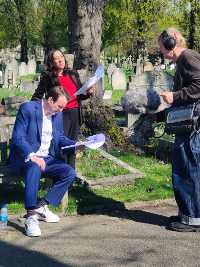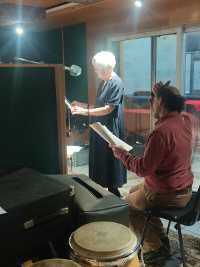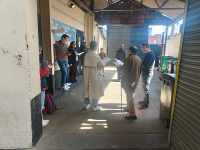
International Arts:
Radio Plays
28 Sept 25: Sunday - A Short History of Tractors in Ukrainian, 1
By Marina Lewycka, dramatised for radio by Tanika Gupta.
In the first episode we meet Mykolai, an eccentric 84-year-old Ukrainian widower living in England. Still grieving his late wife Ludmyla, he shocks his daughter Nadiya with the news that he plans to remarry - to a glamorous 36-year-old woman from Ukraine named Valentyna. To the old man she is the embodiment of youth, art, and love. To his daughters, she is an opportunist. Interwoven with the present-day drama are haunting memories from his late wife, whose voice narrates fragments of family history. Tales of war, famine, revolution, and loss. That's all I can say without giving spoilers ...
Valentyna - Bogdana Kalantay, Mykolai - Istan Rozumny, Ludmyla - Christina Kowalchuk, Nadya - Sanchia McCormack, Vira - Rebecca Front, Mike - Finlay Robertson, Stanislav - Sam Kyslyi, Dubov - Ivantiy Novak, Sonya - Helga Stakhmych, Bob Turner / Priest / Policeman/ Vicar - Jonathan Keeble. Producer - Kateryna Dashko, Director - Kate Guelke. Indie (International Arts Partnership).
-
What a prescient piece of scheduling: the angst of a woman who prides herself on her liberal views and left-wing credentials being confronted with the dilemma of whether to report the illegal immigrant who is fleecing her father. Playwright Tanika Gupta does an excellent job of maintaining the dark humour found in the original novel by Marina Lewycka while promptiing us to think about our own internal political struggles and, indeed, how Western society cares for (or doesn't) its elders. A top-notch production. (....'Anna Jones', RT)
A Short History of Tractors in Ukrainian
This International Arts production for BBC Radio 4 examines how cultural inheritance can curdle into prejudice. Marina Lewycka’s novel, set in Peterborough, is a comedy of manners wrapped around the immigrant experience — and this adaptation preserves its sharp edge.
Nadya and her sister Vira, daughters of Ukrainian immigrants, find themselves appalled when their widowed father, the eccentric 84-year-old Nikolai (a devotee of agricultural machinery, hence the title), falls for Valentyna — a voluptuous thirty-something newcomer with a taste for Western comforts and a visa about to expire.
Their outrage quickly turns hypocritical. Having grown up enjoying the stability their parents sought, they now regard fresh arrivals with suspicion, even contempt. It’s a deft portrayal of second-generation metamorphosis: from the displaced to the gatekeepers, from the excluded to the excluders.
One of the play’s sharper jokes lies in its sound: Nadya’s impeccable BBC English colliding with Valentyna’s gloriously mangled syntax. At first, Valentyna seems the archetypal gold-digger, but the story steadily exposes her bruised humanity and the grim realities she’s fleeing. By the end, the sisters’ moral superiority feels far less secure — as does ours.
Harry Turnbull, Diversity Website Review, Oct 2025 ( @ Turnbullissimo )
2 Sept 2025: Mr Cameron goes to Ukraine
By Stephen Dinsdale & Jonathan Banatvala. Inspired by the events of 2022 — and a Conservative British Prime Minister who thinks it’s a great idea to drive a truckload of Chippy Larder food bank supplies to the Ukraine border — this is a journey fuelled by delusion, goodwill, and midlife crisis.
His co-driver is young, female and a Labour councillor. His greatest fear is that everyone will blame him for Brexit. Hers is that he’ll put on a suit and tie and sing the national anthem. But his real nightmare, as they cross borders, is that no one recognises him.
Matt Forde - David Cameron,
Shazia Mirza - Rizvana Poole,
Jemma Redgrave - Samantha Cameron,
Shelia Hancock - Mary Cameron,
Pippa Hinchley - Canteen lady, German Grandmother,
Matt McGuirk - British trucker, Polish Butcher
Joz Norris - Truck delivery man, passport control,
Wanda Starling - German cashier, Marta,
Adam Ganne - German mechanic, Pavel.
Sound design - David Thomas.
Production Assistant - Isobel Turner.
Executive Producer - Cherry Cookson.
Director - Jonathan Banatvala.
Produced by Jonathan Banatvala and Melanie Nock.
Indie (International Arts Partnership). 45m.
Pictures from the recording ... click on the thumbnails for a better view. All pictures reproduced by permission of International Arts.
The play received good write-ups in RT, the Daily Telegraph and The Times.
A GHASTLY MISTAKE.... 2023
A Ghastly Mistake, by Nicholas McInerny (r4, 1500, 1 Jul 2023), is the story of Sir Ewan Forbes, a Scottish nobleman, general practitioner and farmer. But Ewan was a trans man; he was christened Elizabeth Forbes-Sempill and officially registered as the youngest daughter of John, Lord Sempill. After an uncomfortable upbringing, he began presenting as a man in the 1930s, following a course of medical treatments in Germany. He formally re-registered his birth as male in 1952, changing his name to Ewan, and was married a month later.
In 1965, he stood to inherit the baronetcy of his elder brother William, Lord Sempill, together with a large estate. But the inheritance was challenged by his cousin, who argued that the re-registration was invalid; under this interpretation, Forbes would legally be considered a woman, and thus unable to inherit the baronetcy. The legal position was unclear.
Drawing on Ewan’s autobiography and press reports from the time, this drama explores the court case, telling the story of a man who was intent on living a quiet life as a GP and a farmer, but was resolute about affirming his identity, the validity of his marriage, and his family reputation through the confirmation of his inherited title.
This is another cracking production by International Arts Partnership, for Radio 4.
A Ghastly Mistake: review by Harry Turnbull
Trans rights continue to be subject to culture conflict but who knew the upper classes were involved in a battle for recognition back in the sixties? Dr Ewan Forbes stood to inherit the Scottish baronetcy of Craigiever after denouncing his assigned gender as a girl at birth but the line only allowed for male heirs. His cousin John Forbes Sempill challenged the succession on the grounds Ewan, born Elizabeth, was ineligible.
If the issue causes division now, imagine what it would have been like in the mid-sixties. As it happens the legal case was held ‘in camera’ and although it became widely known after Forbes' death in 1991 the full documentation was only released in 2021.
The story has been revived by writer Nicholas McInerny and will surely resonate given the times we are in. Although set at the time of the court hearing, he uses the device of introducing Forbes deceased mother Gwendolyn as a voice from beyond the grave.
It still seems extraordinary in such times that she embraced her offspring’s transition from female to male, a situation he insisted on from the age of six and made legal on his birth certificate years later in 1952. The title of the tale, ‘A Ghastly Mistake’, refers to Forbes' anger that he was registered a girl at birth.
The dialogue does detail the technicalities of male and female physical attributes and it may be that the actual issue here is not a trans one but that of DSD (Disorders of Sex Development). It's possible that Ewan was a hermaphrodite and frustrated that he wasn't born with the full male attributes more than someone wishing to transition but also angry he had to prove who he was.
Much of the story is told from the point of view of Judge Hunter with observations from Gwendolyn and with further comments from people identifying as trans this swerves slightly into docu drama territory.
And of course underlying the drama of the legal case is the issue of women being denied the right to succession. An intriguing story.
Listen on BBC Sounds to find out what happens.
Harry Turnbull
BLACK WATER....2023
28 May 23. By Roland Schimmelpfennig, translated by David Tushingham, with a score by Simon Slater. A new play from International Arts: (translated from the Czech version 'Cerna Voda' which aired at the 2019 International Radio Drama Festival ); Radio 3. Produced by Melanie Nock & Jonathan Banatvala. The play was adapted to make it suitable for the longer 90m time slot.
'Either this place belongs to everyone. Or no-one', says pretty Leyla.. The play tells the story of two groups of very different young people. One is a group of the children of Turkish migrant workers, the other a group of young middle class Germans. They live in different parts of the city; from different backgrounds; young people with vastly different expectations of what adult life will bring. Their paths have never crossed. But one warm summer night, they all climb the fence of a forbidden swimming pool. An initial hostility melts into the sensory pleasures of the night. They enjoy the feel of the water, the sight of the stars, the warmth of the night and the unaccustomed intimacy with strangers.
Roland Schimmelpfennig’s play, originally for the German stage, interweaves the stories of Frank, Leyla, Cynthia, Freddie, Murat, Mehmet and Karim; Ollie, Aishe and Kerstin. Memories of the night in the black water at the swimming pool are intertwined with snapshots of their lives twenty years later, when Frank is about to become the youngest Government minister; Aishe will save the life of Kerstin and Cynthia is the head teacher of the school Karim’s child attends.
Chorus performed by Shyko Amos, Chloe Sommer, Amanda Bright, Joshua Riley, Razak Osman and Cavin Cornwall.
Kerstin ..... Chloe Sommer, Cynthia ..... Amanda Bright, Olli ..... Jack Benc, Freddie ..... Razak Osman, Frank ..... Joshua Riley, Mehmet ..... Atilla Akinci, Leyla ..... Danusia Samal, Murat ..... Omer Cem Cultu, Aishe ..... Ada Burke, Karim ..... Hemi Yeroham, Frank’s father ..... John Peters, Frank’s mother ..... Abigail McKern, Murat’s father ..... Jem Kai Olsen, Leyla’s father ..... Nej Adamson. Sound Design, David Thomas. Directed by Jonathan Banatvala.
25 Mar 2023: Saturday Play - The Song of the Cossacks
By Jean Binnie, from the stage play, dram. Stephen Wyatt, for International Arts. At the end of the war in 1945, the Yalta agreement provided that Prisoners of War were returned to their home country. The Cossacks, bitterly opposed to Stalin, had joined the German forces to fight against him. Stalin insisted they be returned to their “homeland” in the USSR. All parties knew this would mean certain death.
In this fictional dramatisation of true events, Major Christopher Graham and Sergeant Wilson are in charge of a Cossack prisoner of war camp. The prisoners comprise whole families including women, children and young babies. The two officers, struggling with a lack of resources and manpower, work with the Cossack generals to run an orderly camp. The Cossack generals believe the British to be trustworthy and, although deeply concerned at the prospect of a forced return to the Soviet Union, accept the two officers’ assurances that this will not happen. The play examines the dilemma of ordinary army officers ordered to betray the people whose trust they had gained and whose welfare they had been in charge of. Running through this play is the 2022 testimony of survivors, voiced by actors from the Teatr Napadoli in Kyiv, and the testimony provided to the subsequent enquiry by Major Rusty Davies, the British Liaison office of the time. Major Christopher Graham: Finlay Robertson, Sergeant Wilson: Phil Carriera, Sir William Temple: David Acton, John Pelham: Lawrence Russell, Colonel Wensley: Jonathan Keeble, General Dorov: Christopher Douglas, General Skiro: Geoffrey Kirkness, Captain Andrei Rostov: Ivantiy Novak, Katya Dorov: Amrita Acharia, And Mikhaila Rostov: Jilly Bond. The testimony of Rusty Davies performed by Christopher Ettridge. Verbatim testimonies performed by actors from Teatr Napodoli, Kyiv. Dramatised for radio by Stephen Wyatt from the original stage-play by Jean Binnie, with additional material by Kit Hesketh-Harvey. Recorded in London and Kyiv, and on location. Sound Design: David Thomas. Director: Jonathan Banatvala. Producers: Jonathan Banatvala and Melanie Nock. Indie (International Arts Partnership). 90m.
Song of the Cossacks
......Harry Turnbull writes....
A solemn lament to the thousands of Cossacks Britain consigned to death in another shameful episode in this country’s history.
Jean Binnie’s stage play has been reconstructed for radio to retell the story of the fate of Cossacks following the end of WWll hostilities. Fighters along with civilians, women and children were held in camps, hoping the fair-minded Brits would allow them to go on their way. However, Churchill had already sold them out in an agreement with Stalin at Yalta.
This radio production was severely jolted when writer Kit Hesketh Harvey suddenly passed away but in true ‘the show must go on’ fashion producers Jonathan Banatvala and Melanie Nock engaged Stephen Wyatt to complete the project in double-quick time.
It is of course a bleak story and the mood is reflected in sombre choral music throughout. In addition, there are real-life testimonies from those who were involved and portrayed by actors.
Wyatt confers a human element in the story by creating fictional characters in the shape of British officers appalled when they discover their task is to hand people over for execution or gulags.
It should be pointed out that many of the Communist-hating cavalry warriors had fought on the side of the Nazis and therefore did not get universal sympathy.
The production demonstrates that people are often the forgotten victims of global geopolitics.
@Turnbullissimo, April 2023
30 May 2022: Barbeque 67 - The Original Summer of Love
By Andy Barrett. A story about the first-ever UK rock festival.
Doug - Robert Glenister,
Tereza - Anamaria Marinca,
John - Gerard McDermott,
Young Doug - Tom Glenister,
Young John - Joe Parker,
Jimi Hendrix - Shaq B. Grant,
Stefan - Timotei Cobeanu,
Mr Carlton - Roger Alborough.
Additional real-life contributors:
Jane Cooper,
Lynton Guest,
Doug Kendall,
Christopher Longstaff,
Rob Mardle,
Vic Martin,
Nick Mason,
Zoot Money,
Rob Offer,
Mick Peacey,
Alastair Stewart,
Colin Ward,
Geno Washington.
Sound Design: David Thomas,
Director: Andy Jordan,
Producer: Jonathan Banatvala,
Executive Producer: Melanie Nock.
Indie: International Arts Production.
I greatly enjoyed BARBEQUE 67 - THE ORIGINAL SUMMER OF LOVE, by Andy Barrett (R4, 1415, 30 May 22); a play about the first UK rock festival. It included accounts from those who took part, including Geno Washington, Zoot Money and Nick Mason from Pink Floyd. It's set near Spalding in 1967. At that time the area was home to labourers from Eastern Europe, and the fields were all full of tulips. A retired tulip farmer, Doug, who went to that festival, meets a young Rumanian woman, who shares his enthusiam for Jimi Hendrix. On 29th May 1967 thousands of people congregated in a giant agricultural shed, the Tulip Bulb Auction Hall. They heard Hendrix, Eric Clapton, Geno Washington, Pink Floyd, The Move, Zoot Money and local band Sound Force Five. Now, at a time when the future of foreign workers in British agriculture is uncertain, the play is particularly apposite. It is some time since we had a Radio 4 play from Andy Barrett; I can recall 'The Perfect Wood', a comic play about a Bowls tournament some years ago, but nothing since then. Doug was played by Robert Glenister and Tereza by Anamaria Marinca, with Tom Glenister as young Doug. There were also contributions from some of the musicians who took part. Jonathan Banatvala was the producer, assisted by Melanie Nock, and the director was Andy Jordan. This was an Indie production by the International Arts Partnership; the group which organizes the annual UK International Radio Drama Festival in Canterbury. (.......ND, Diversity Website Radio Drama Review, Sept 2022.)
Nigel Deacon / Diversity website
Above plays known to exist in VRPCC collections




